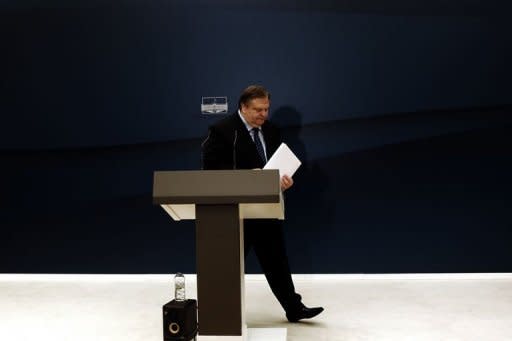Greece fails to form government amid German, EU warnings
Greek conservatives failed Monday to form a government, paving the way for anti-austerity leftists to try and cobble together a coalition despite Germany and EU warnings the country must stick to its bailout deal. The development underscored the precarious situation of the country in its fifth year of recession, which needs bailout funds to stay afloat but where painful austerity measures have given rise to widespread voter anger. Conservative New Democracy leader Antonis Samaras said his efforts to form a "national salvation" administration had failed, meaning the runner-up, radical leftist party Syriza, would now be tasked with forming a government. "I did whatever I could to secure a result but it was impossible," Samaras said in a televised address after a day of separate meetings with fellow leaders. "I informed (head of state President Carolos Papoulias) and returned the mandate," the 60-year-old leader said. Samaras was rebuffed by Syriza and the small Democratic Left group, while the nationalist Independent Greeks and the Communist party refused to even meet with him. Third-place socialist Pasok, formerly in a coalition with New Democracy, agreed to cooperate but only if the leftists also joined. The parties' snub of Samaras indicates they are paying more attention to the punishing message sent Sunday by voters fed up with austerity measures than to worries about the future of the euro or stern warnings from Berlin and Brussels. German Chancellor Angela Merkel, the chief proponent of austerity as the main way out of the eurozone crisis, said Monday it was "of utmost importance" that Greece stuck to its reform path, although conceding this was "difficult". A spokeswoman for the European Commission meanwhile said Brussels "hopes and expects that the future government of Greece will respect the engagements that Greece has entered into." Samaras' party had said he would try talking with every party that won seats in parliament except the neo-Nazi Golden Dawn. The task will now fall to Syriza leader Alexis Tsipras, who will be summoned by Papoulias at 1100 GMT on Tuesday and given three days to form a government. Tsipras has said he would seek to form a left-wing coalition to reject the "barbaric" measures of the EU-IMF loan agreement that saved Greece from fiscal collapse. A new government has to be formed by May 17 or new elections will be called. The country, in its fifth year of recession with unemployment at 20 percent, is committed to finding in June another 11.5 billion euros ($15 billion) in savings over the next two years. New Democracy and the left-wing Pasok, which have alternated in power since 1974, saw their share of the vote collapse to 32.1 percent from 77.4 percent at the last election as voters supported instead a raft of anti-austerity parties. This left the two parties, which favour sticking to the bailout but with easier terms, with 149 MPs in the 300-seat parliament, insufficient for a re-run of the outgoing coalition led by technocrat Lucas Papademos. Instead, voters angry after two years of cuts handed parties wanting to tear up the agreements a total of 151 parliamentary seats between them, including the leftist Syriza, which with 52 seats relegated Pasok to third place. The others included Golden Dawn with 21 seats, the right-wing Independent Greeks with 33 MPs and the communist KKE with 26. Syriza head Tsipras called the election a "message of overthrow". Berenberg Bank economist Holger Schmieding warned Monday there was a risk that "Europe could turn off the flow of support funds and thus force Greece to leave the euro." Economist Guillaume Menuet of Citi said there was "significant potential" for Greece to miss its next round of targets and a 50-to-75-percent chance of what he called a "Grexit" within 12-18 months. Panayotis Petrakis, an economics professor at Athens University, expressed hope however that new French president-elect Francois Hollande "would prevent Europe treating us too harshly. There is still a little room for manoeuvre." This was also a source of hope for voter Nadia Semouiliana, an engineer, who told AFP in central Athens: "Maybe now with the French elections this is a new day for all of Europe." Greece's stock market plunged 6.8 percent. Other European markets and the euro also fell earlier Monday, in part also due to left-winger Hollande's victory, but recovered ground later, with the CAC 40 in Paris closing 1.65 percent higher and Frankfurt's DAX 30 up 0.12 percent. US stocks opened modestly lower on Wall Street.




